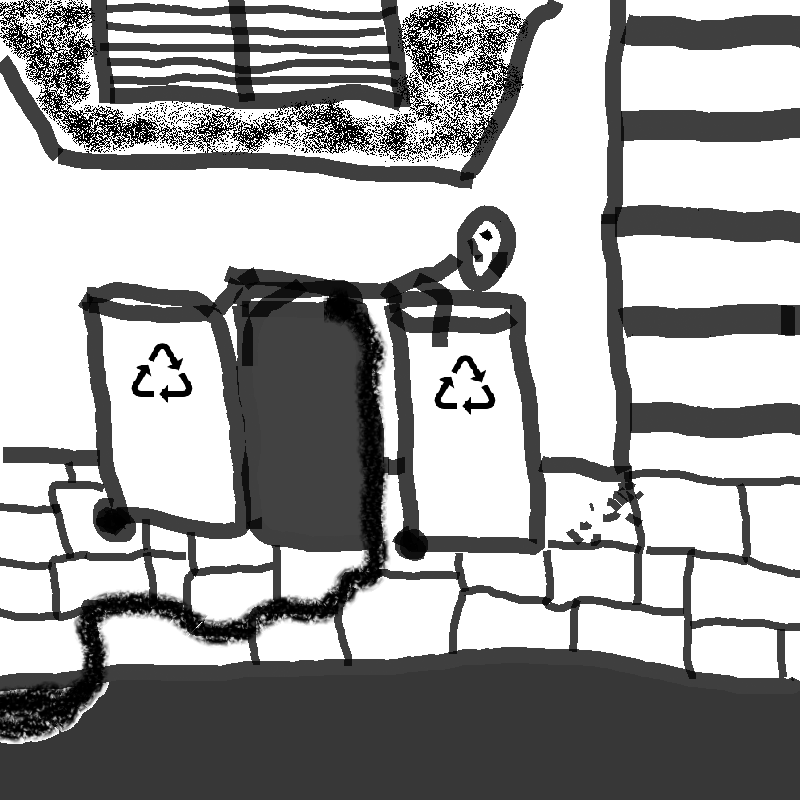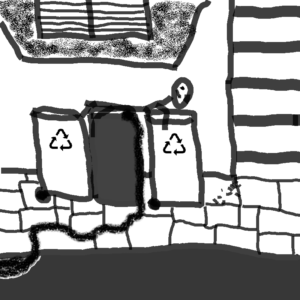
Learning to Forget

Learning to Forget
The first essay in Kevin Breathnach’s ‘Tunnel Vision’ (2019) is a profile of portrait photographer Berenice Abbott, whose ‘Self-Portrait with a Large-format Camera’ (1926) frames Breathnach’s account of her life, her place within the 1930s arts scene of New York, and the relationship between her photography and the viewer.
Breathnach writes, “[Abbott’s] gaze and her camera’s are distinct. Berenice Abbott is not her camera, and the one for whom she is posing isn’t touched by it.”
Breathnach explains, however, ‘Self-Portrait with a Large-format Camera’ “is not… a reflected image” – a selfie. Abbott’s camera is pointed well away from the viewer. It’s her gaze that’s coming straight for you.
As I pondered this, Nell put down her copy of Dubliners, resting it into the crenel her raised knees had carved into the duvet, and picked her phone up off the bedside table. Nell gave the phone her thumbprint, and began flicking her thumb repeatedly, in an upwards motion. I reached across Nell’s body and picked up my own phone, which previously lay underneath hers. It seemed rude to let Nell be the only one scrolling. My phone screen covered up Berenice Abbott and almost all of her photograph. Only the books resting atop her fireplace mantel remained visible behind the glare.
I opened Instagram and immediately saw the image I didn’t want to see. I returned to the home screen. My thumb guided the little pink and orange logo depicting the outline of a camera up to the top left corner of my home screen and dropped it into the little icon of a rubbish bin.
⟳⟳⟳
I kept reading Breathnach aloud. I guess it wasn’t the best thing to do. The passage concerning the author’s methadone-fueled, twelve hour-long, “clammy and eventually painful” masturbation sessions was particularly off-putting for our libidos. It did, however, ignite in Nell a sincere desire to score some MDMA, and using a contact procured from a coursemate, Nell began to make arrangements for the purchase of too many grams for my personal comfort. Since my overdose, I’ve avoided drugs entirely, and I didn’t care, hallucinogen, stimulant, anti-depressant, whatever, Nell, I said, I don’t care, we’re not taking anything, not in this house. Go home and bomb it there if you want, but I’m fucking clean, I’m not going back to shit. I guess I got pretty heated towards her about the whole thing, but Nell was okay with me in the end. She didn’t want to go back home for anything.
⟳⟳⟳
I made Nell porridge and apologised for running out of bananas to chuck on top. I went into the bathroom and examined my body in the toothpaste splattered mirror. My stomach looked bloated and weird, more than usual.
⟳⟳⟳
Pornography seeped into Breathnach’s dreams, his waking visualisations, a “scattering of film stills, a moving collage of porn image” resided on the dark projection behind his mind’s eye. This passage encouraged me to stop reading and discuss pornographic viewing habits with Nell. Within this conversation, the idea of watching a pornographic film together never came up.
⟳⟳⟳
Nell ordered Deliveroo shit and I picked at her leftovers. I went into the bathroom and gagged. The pain was just too much.
⟳⟳⟳
I told Nell that when I have sex in my dreams, neither I nor the object of my fantasy are ever able to climax.
Same, she replied.
⟳⟳⟳
In the evening, I cooked mushroom tagliatelle, though neither of us ate any of it. The process took me out of my own head, though, and I told Nell I couldn’t remember what I’d been so anxious about.
Instagram stories die after twenty-four hours, she said, sitting at the kitchen counter, not looking up at me. Your brain’s learning how to forget, she said. Once that day expires, you’re forgetting.
What if the person saves it? I asked. You can do that, right?
And are you ever forced to look at someone else’s reflected image? she said, turning the page on
Joyce. Would you ever want to?
Abbott’s gaze and her camera’s are distinct, I said. I think.
Going back to sleep felt like entering a pitch-black train tunnel. There was only one track through.
In the morning, the only thing still in my head were the books above the fireplace.
⟳⟳⟳
We drank too much tea and ate too many chocolate fudge brownies from a plastic tub. I couldn’t walk without doubling over and biting my tongue to hide the pain. I couldn’t understand why anyone would ever want to eat or drink anything. I wanted nothing to pass my lips but Nell.
⟳⟳⟳
The first crack in Breathnach’s relationship with his partner Colette marked the end of the Tunnel Vision essay, and the end of Nell’s time in my bed.
We’re out of porridge, I said, walking into the bedroom.
Have you finished your review? Nell asked, her wet hair mopped out on my pillow.
I finished reading the title essay, I said, that’s enough, I reckon. Probably.
Did you include the author’s previous work? Nell asked, flipping the duvet off her torso.
What? I said, puffing my cheeks for some reason.
Did you cover the plot and genre? Nell asked, stretching out her arms and legs.
Who could possibly care about any of that? I said, putting a belt through the loops of my trousers.
Nell yawned her little head off.
Last time we ran out of porridge, I said, you’d been here six days, so, y’know.
⟳⟳⟳
On the walk back to Nell’s, my stomach cramped up. Weighed down by shit fudge, greasy junk, and dried out chunky porridge, my insides were ballooning to an abscess half the size of me. Instead of requesting permission to throw up in her toilet, I asked Nell if she’d had a good time at mine.
Ah, crap, Nell said, I left Dubliners at yours.
My hands stayed in my coat pockets but tried to massage my stomach anyway.
Can I come over and pick it up? Nell said.
Sure. I said. Goodnight then.
Walking away, into the bitter chill of the wind, my abscess refused to comply with my attempts to calm its swelling. I crouched down, behind a green wheelie bin, I couldn’t do anything else. My breath was short and sharp, I think. Down my leg, this sludge dribbled out, and started flowing down the hill via the cracks in the pavement. That weight had been too much to carry, but there was a chance things could get back to how they used to be, some day.